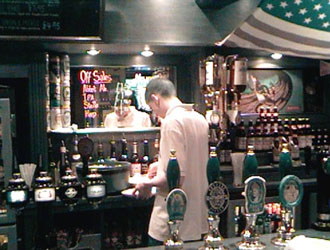 The British Public House (Or as its better known as, The Pub) "There is nothing which has yet been contrived by man, by which so much happiness is produced as by a good tavern or inn" Samuel Johns
The British Public House (Or as its better known as, The Pub) "There is nothing which has yet been contrived by man, by which so much happiness is produced as by a good tavern or inn" Samuel Johns
A public house, usually known as a pub, is a drinking establishment found mainly in Britain , Ireland , Australia , New Zealand and other countries influenced by an English cultural heritage. A pub which offers accommodation may be called an inn or hostelry. Colloquialisms for the public house include boozer and the local.
In 1393 King Richard II compelled all pubs to erect signs outside their premises. In the past pictures were more useful than words as many of the patrons were illiterate. Many pubs today still have very decorative signs hanging outside depicting the name of the pub, including images of real objects or animals, a famous person or their "coat of arms".
Pubs often have traditional names, reflecting various categories. Examples include: The Mason’s Arms, The Cricketers, The Lord Nelson, The Royal Oak, The King’s head and the Red Lion.
Recently pub chains have sprung up which use semi-traditional sounding names. These are often owned by brewing companies and there beer selection is often limited to manly those beers from that particular company. Names for these pubs include The Rat and parrot, The Slug and Lettuce. Pubs have been an important part of the British Community for many hundreds of years. They are culturally, socially and traditionally different from places such as cafes or bars found elsewhere in the world. In the United Kingdom there are approximately 61,000 public houses. In many areas this can be the main focal point of the local community. In general they are open from 11 am to 11 pm , but times may vary with each establishment. If you watch a major British soap opera you will see that they all feature a pub as their focal point. Pubs are predominantly places for the sale and consumption of alcoholic beverages (beers, wines, spirits and alcohols). Beer can range from pressurized "keg" beer, "cask-condition" real ale to bottled beers. Most pubs offer a cheerful and pleasant place to sit and relax with friends, have a reasonably priced meal, play a game or even sit and read a book or the paper.
The interior of a typical English pub
In recent years pool has become popular in British pubs. Traditional games include darts, bar billiards and skittles. Many pubs also have special events from tournaments for the aforementioned games, quiz nights, live bands or even karaoke. Many also show football or other sports events on big screen televisions. Food has become a far more important as part of a pubs trade. Most pubs serve lunches and dinners at often very reasonable prices. Many serve excellent meals which can rival the best restaurants. Going for a "pub lunch" can be a real treat and a chance to relax before the afternoons’ work begins.
In the Pub
Ordering "a beer" in a pub is like asking for "a coffee" in Starbucks. A pub offers a wide and varied selection of brews, perhaps as many as 20 different types of ales, lagers, stouts and bitters. Most are draught (on tap), some in bottles and a few in cans. Most pubs also serve wine and hard liquor. (They will also have non-alcoholic drinks, coke, orange juice tea and coffee, but not a large range). To order a glass of draft beer, you ask for "a pint." At more than half a liter, though, a pint is a large drink. You can also order a half pint. Just ask for "a half."
Contrary to the widespread rumor, the British do not serve their beer warm. Rather, a drinks temperature depends on its type. Lagers are served cold, while bitters and stouts will be only cool.
Many a traveler has found the whole pub experience rather bewildering. This is because this venerable British institution has its own set of unwritten etiquette rules, which you need to observe to keep on the best side of the natives.
点击查看本频道更多精彩内容